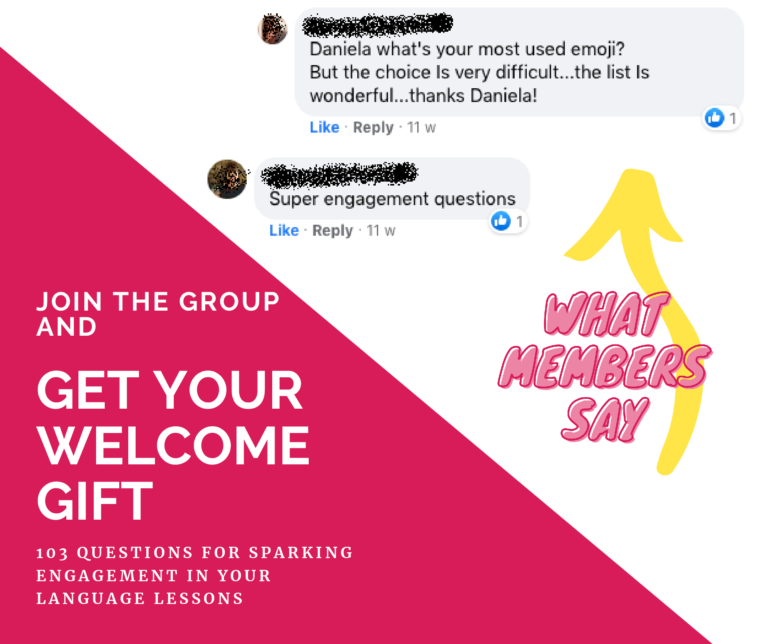
Hello everyone! A piece of feedback I get often from my students is: ‘All this playing roles as a characters during the course, I think it helped me psychologically to feel at ease at speaking’. Today I would like to share with you how playing roles helps students to improve their English skills, enrich their vocabulary and boost their fluency in an English speaking course.
The lesson plan of ‘Learn English through Drama‘ is designed in order to get the students involved in different kinds of activities where they can memorise new words and phrases and put them into use through drama exercises. When it comes to practising and putting into use (speaking!) there is a number of exercises we propose to the students: simple role-plays, Strategic Interaction role-plays and process drama activities. Then, we ‘sprinkle’ all the activities with suggestopedia! What is the difference between those approaches, how do we use them and why?
In simple role-plays students are asked to play a structured and limited individual role: they have a character’s profile, a task to accomplish and have to follow precise instructions. This kind of exercise is perfect at the beginning of the course, when students need to get familiar with the drama approach and need to be led by clear and simple instructions. Students get prepared individually and interact in pairs or in a group following individual instructions. The language skills involved are basic: students need to show how they use the right vocabulary and the grammar structures correctly. For instance, in our English language summer school uk, we use role-play in order to memorise words, phrases and grammar structures.
In Strategic Interaction role-plays (R. Di Pietro) students work in groups in order to discuss and prepare an interaction with a particular role. They are asked to sort out situations and find suitable solutions, for instance. In order to come up with an effective script, they need to think about what words to use (what’s the message), but also how to communicate that message (body language). They are asked to pay attention to the body language as well as other aspects of the communication in English that affect the meaning of the message: gestures, intonation, use of particular words or phrases, what registers to use (formal versus informal). For instance, in our latest English language summer school uk, we used SI a lot in order to practise the communicative registers of the English language and body language. That was really effective! Also in Strategic Interaction the setting of the interaction between roles can change dynamically during the interaction itself, which is exactly what happens in the reality. This approach is perfect when we want our students to take a step forward in their English skills and practise what they know (vocabulary, grammar, body language in English, etc.) within a realistic and dynamic framework that challenges them to put a number of skills into use at the same time.
In process drama students work always in groups and are asked to shape up a circumstance as they are involved in a special enterprise, they hold an attitude and have a task to perform. Students discuss and carry out activities (proposed by the teacher) in order to shape the group’s role. What’s interesting is that the more the groups work on the roles, the more the roles created by each group differ from each other in terms of background, skills, experience, attitudes, etc. ‘This group role provides tremendous support for L2 students to overcome insecurities as well as their incompetence in using the target language at this initial stage of making drama.’ (ref. Shin-Mei Kao and Cecily O’Neill, 1998). Students feel free to make their contribution according to their skills and level, less competent students never expose their lack of skill and still can be part of the event. In our English language summer school uk last year, we provided the students with different scenarios that enabled them to explore the main topics the course was supposed to cover. This enabled the students to enrich their vocabulary and put it into use within a more complex and structured context. Also, the less competent students felt at ease at making their little contribution, which motivated them to absorb new inputs from their mates and try to give more inputs. It really worked, especially for particularly shy people!
In suggestopedia we use characters in order for the students to project ‘their best’ and play in someone else’s shoes. The teacher invites the students to create their own characters, who are supposed to have some specific skills – above all, for instance, they have to be very good at speaking English! It might seem to be too basic or simple, I know. Nevertheless, it is one of the key points in the whole English speaking course ‘Learn English through Drama’. The psychological effect is tremendous: students feel free to be whoever they wish and, what’s most important, they feel free to speak and make mistakes in order to learn.
But that is not the only way we use suggestopedia in our English speaking course for learning English through Drama. Suggestopedia is much more than creating characters. It is a whole framework that determines how teachers should communicate and interact with their students and that enables students to memorise faster and overcome their learning barriers quicker. This is what really takes this English speaking course apart from other courses for learning English through drama.
Above all, we must not forget that drama is art and art owns itself high motivational power for learning languages.
I’ll see you soon with next post about drama, English and suggestopedia! Meanwhile, how about taking a look at the courses coming soon? 🙂
Click here to see the next courses
Daniela
Want more support?
Join the Facebook group Independent Language Teachers Collective to get daily advice, tons of free training and to branch out with other independent language teachers like you!
ALSO…
Available only for the Collective members: free list 103 question for sparking engagement in your language lessons.
This is what members say about the freebie:

Join in the Collective and grab your welcome gift:
Join Facebook Group

